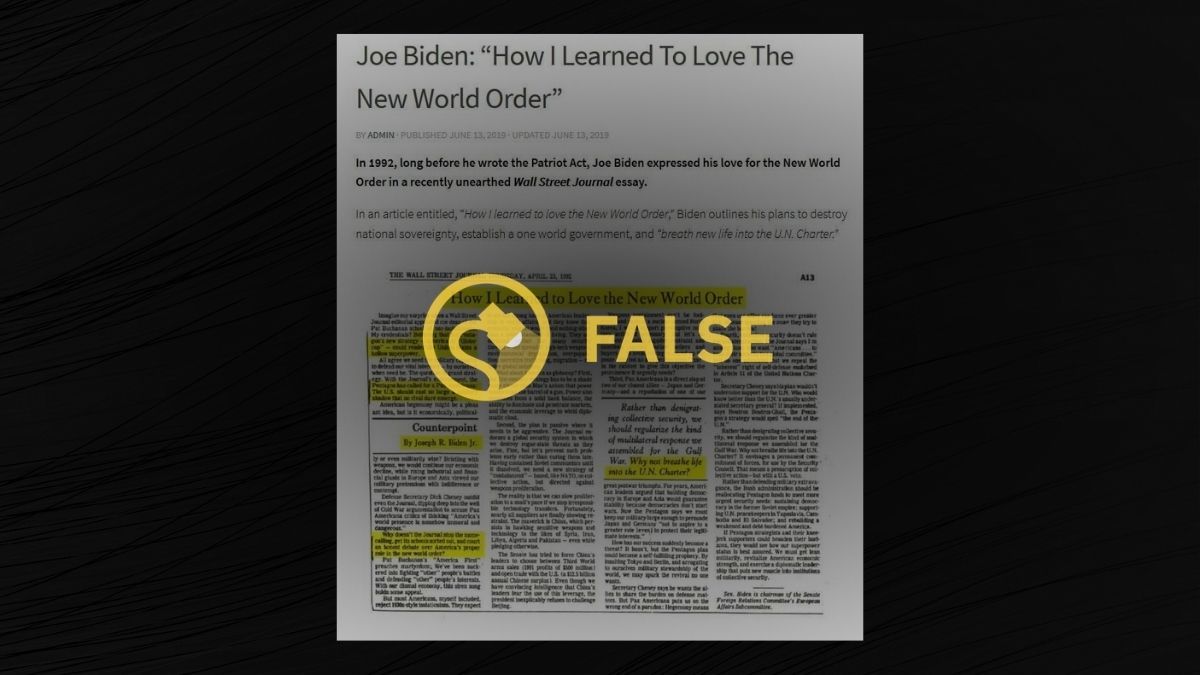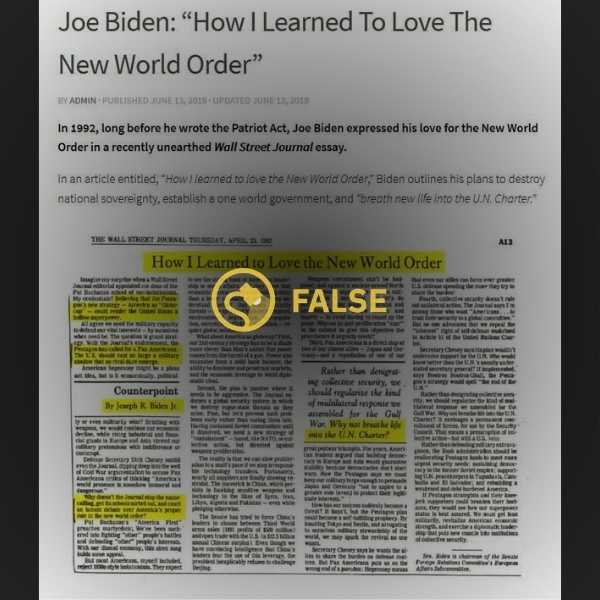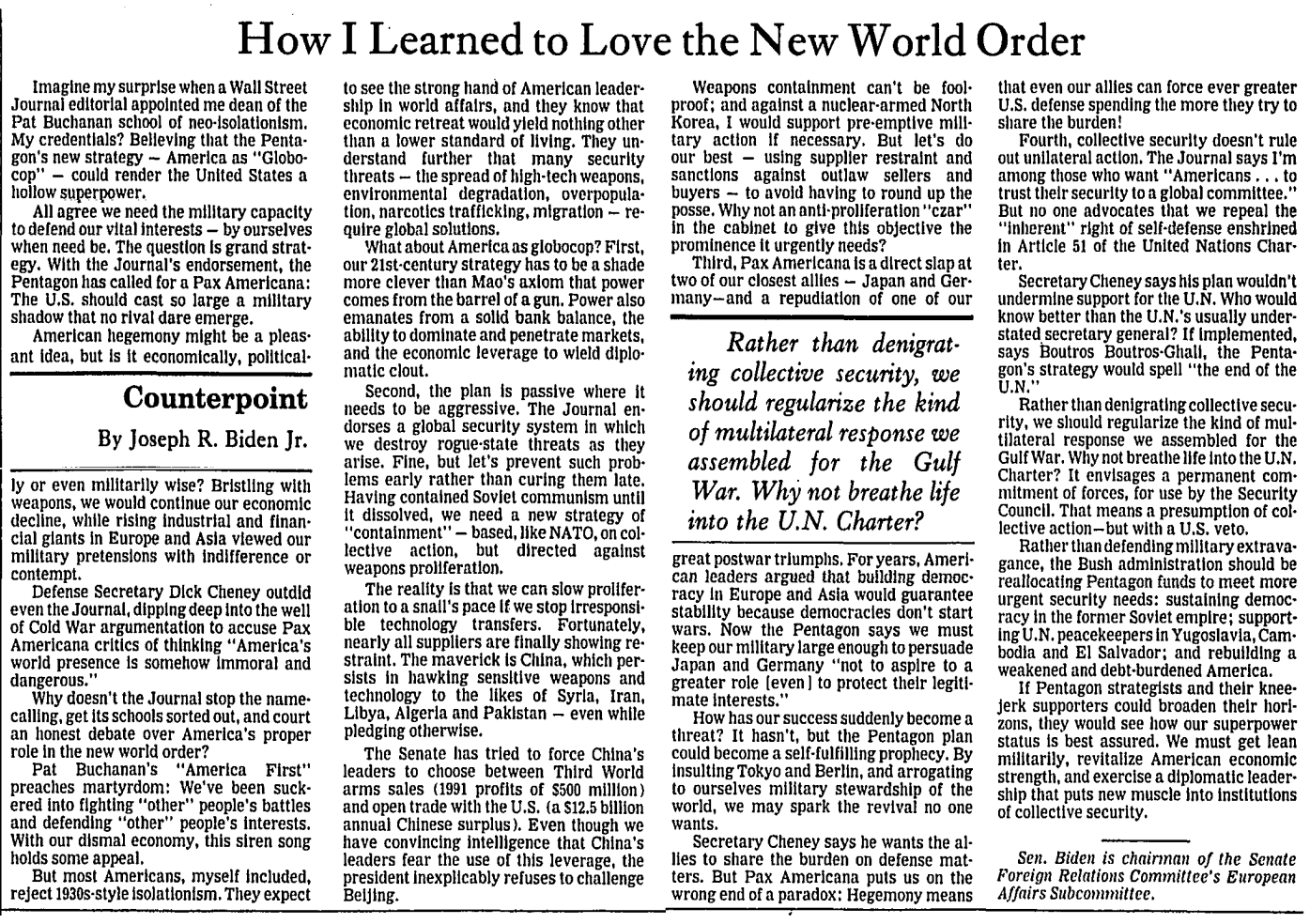While the Wall Street Journal did publish an op-ed essay by Biden titled, “How I Learned to Love the New World Order,” he did not argue for destroying national sovereignty, but rather to “breathe life into the U.N. charter” that promoted multilateral action. The article argues against America’s role as a “globocop” that resorts to military intervention, and calls for greater economic strength and robust diplomacy.
As the Taliban took over Afghanistan, U.S. President Joe Biden pulled American troops out in August 2021, with the last military plane departing at the end of the month, marking the end of a two-decade-long presence in the country.
Biden has faced plenty of criticism for the rushed departure particularly from right-wing voices, and the internet pulled out an old article he wrote for The Wall Street Journal (WSJ), titled "How I Learned to Love the New World Order,” to bolster arguments against him. According to numerous posts like this one, the essay was arguing for the destruction of “national sovereignty” and the establishment of “a one world government.”
Some claimed that because of the headline, Biden supported a “New World Order,” which advocates for “one world government.” This stems from the New World Order (NWO) conspiracy theory, which claims that a secret group of global elites is seeking to establish an all-powerful, authoritarian, one-world government.
The essay was indeed published by The Wall Street Journal on April 23, 1992. We found a copy in the archives of the New York Public Library. The full version can be seen below:
Biden wrote the essay in response to a Wall Street Journal editorial that claimed he was in favor of “neo-isolationism.” To be clear, in Biden's essay, he was not talking about the NWO conspiracy theory. He argued that the Pentagon’s strategy of making America a “Globocop” would render it a “hollow superpower.”
The highlights made in the blog post above about his essay do not support the argument that Biden wants to “destroy national sovereignty.” In the article Biden argues for Americans to pull back on military intervention and build up economic might: “Bristling with weapons, we would continue our economic decline, while rising industrial and financial giants in Europe and Asia viewed our military pretensions with indifference or contempt.”
The essay also addresses America’s role as a “Globocop,” arguing that “Power also emanates from [...] the economic leverage to wield diplomatic clout,” and not from “the barrel of a gun.” Biden argues in favor of multilateral military action by breathing “life into the U.N. Charter.” He envisions "a permanent commitment of forces, for use by the Security Council. That means a presumption of collective action — but with a U.S. veto.”
He concluded: “We must get lean militarily, revitalize American economic strength, and exercise a diplomatic leadership that puts new muscle into institutions of collective security.”
The blog post makes another claim: that Biden wrote the WSJ article many years before writing the Patriot Act, a counterterrorism bill that increased surveillance capabilities by U.S. law enforcement after 9/11. This is partially true, because Biden did support the Patriot Act and claimed he was responsible for authoring earlier versions of counterterrorism legislation that featured prominently in it. Biden introduced and authored the Omnibus Counterterrorism Act of 1995, which he argued provided one source of inspiration for the 2001 Patriot Act.
In October 2001, he said in a Senate speech supporting the Patriot Act: “It allows law enforcement to keep up with the modern technology these terrorists are using. The bill contains several provisions which are identical or nearly identical to those I previously proposed.”
The Patriot Act was criticized by civil rights advocates and the American Civil Liberties Union (ACLU) who said it turned regular citizens into suspects, and resulted in a loss of privacy. While civil rights experts have criticized his support for the law, that criticism does not suggest that Biden is trying to build a “one world government.”
While the WSJ did publish this essay by Biden, the article did not make the arguments that critical blog posts on social media are claiming. As such, we rate this claim as “False.”
Sources:
“Afghanistan: Last US Military Flight Departs Ending America’s Longest War.” BBC News, 31 Aug. 2021. www.bbc.com, https://www.bbc.com/news/world-asia-58390085. Accessed 8 Sept. 2021.
"How I Learned to Love the New World Order." Wall Street Journal (1923-), Apr 23, 1992, pp. 1. ProQuest, https://ezproxy.nypl.org/login?url=https://www-proquest-com.i.ezproxy.nypl.org/historical-newspapers/how-i-learned-love-new-world-order/docview/135656899/se-2?accountid=35635. Accessed 8 Sept. 2021.
Hsu, Hua. “50 Years of Conspiracy Theories - New World Order -- New York Magazine - Nymag.” New York Magazine, https://nymag.com/news/features/conspiracy-theories/new-world-order/. Accessed 8 Sept. 2021.
Senate Approves USA PATRIOT Anti-Terrorism Legislation. https://sgp.fas.org/congress/2001/s102501.html. Accessed 8 Sept. 2021.
“Surveillance Under the Patriot Act.” American Civil Liberties Union, https://www.aclu.org/issues/national-security/privacy-and-surveillance/surveillance-under-patriot-act. Accessed 8 Sept. 2021.
Ungurean, Geri. “JOE BIDEN Proclaimed How He ‘Learned to Love the NEW WORLD ORDER’ in a Wall Street Piece from 1992: Article Is Clearly Shown in This WP Piece.” Absolute Truth from the Word of God, 30 Aug. 2021, https://grandmageri422.me/2021/08/30/joe-biden-how-i-learned-to-love-the-new-world-order/. Accessed 8 Sept. 2021.



